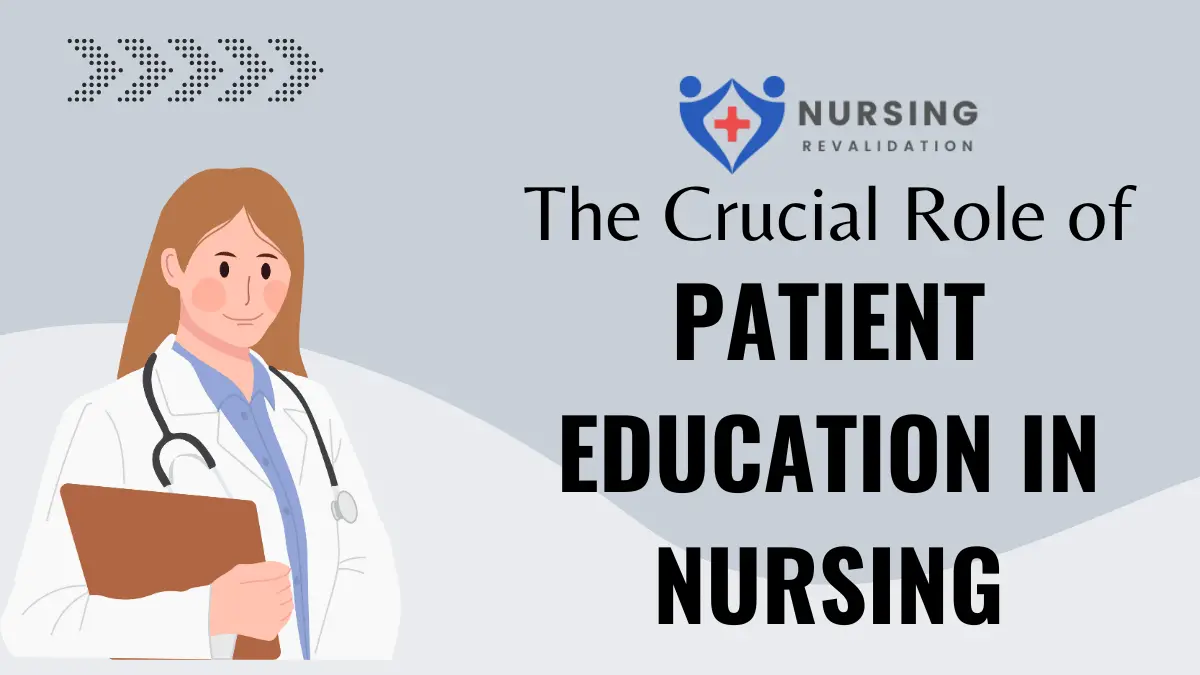In the dynamic landscape of healthcare, where patient-centered care is gaining traction, the role of nurses transcends beyond bedside assistance. Nurses serve as educators, empowering patients with knowledge crucial for self-care, treatment adherence, and overall well-being. This article delves into the significance of patient education in nursing, highlighting its profound impact on healthcare outcomes and patient satisfaction.
The Foundation of Patient Education in Nursing
Understanding Patient Education
Patient education in nursing encompasses a spectrum of activities aimed at imparting knowledge, fostering understanding, and promoting behavioral change among patients. It goes beyond mere dissemination of information, focusing on engaging patients in their care journey, equipping them with skills to manage their health effectively.
Historical Evolution
The concept of patient education in nursing has evolved significantly over the years. From Florence Nightingale’s emphasis on health promotion and disease prevention to the contemporary patient-centered care models, the role of nurses as educators has undergone a paradigm shift. Today, patient education is recognized as a cornerstone of quality healthcare delivery.
The Impact of Patient Education: A Statistical Overview
| Outcome Measure | Impact of Patient Education |
|---|---|
| Treatment Adherence | Patients who receive education are X% more likely to adhere to their treatment regimen. |
| Hospital Readmission | Hospitals with robust patient education programs report a Y% decrease in readmission rates. |
| Health Literacy | Z% of patients demonstrate improved health literacy following structured education sessions. |
The Importance of Patient Education in Nursing
Enhanced Disease Management
Patient education plays a pivotal role in facilitating disease management and treatment adherence. By imparting knowledge about medical conditions, treatment options, and self-care strategies, nurses empower patients to actively participate in their healing process. This proactive engagement often leads to better treatment outcomes and reduced healthcare costs.
Promoting Health Literacy
Health literacy, defined as the ability to obtain, process, and understand basic health information, is crucial for informed decision-making and self-management of health conditions. Nurses, through patient education initiatives, bridge the gap in health literacy, ensuring patients comprehend medical terminology, treatment protocols, and preventive measures.
Preventing Complications
Effective patient education can significantly contribute to the prevention of complications associated with chronic diseases and medical procedures. By educating patients about warning signs, symptom management, and lifestyle modifications, nurses empower individuals to take preventive measures, thereby reducing the incidence of adverse events and hospital readmissions.
Fostering Patient Empowerment
Empowering patients to actively participate in their care fosters a sense of autonomy and self-efficacy. When patients are equipped with knowledge and skills to make informed decisions about their health, they become partners in the healthcare process rather than passive recipients of care. This collaborative approach enhances patient satisfaction and overall healthcare experience.
Strategies for Effective Patient Education
Individualized Approach
Recognizing the diverse needs and learning preferences of patients, nurses employ an individualized approach to patient education. By tailoring educational interventions to suit the unique circumstances of each patient, nurses ensure maximum comprehension and retention of information.
Clear Communication
Effective communication lies at the heart of patient education. Nurses employ clear, jargon-free language, and utilize visual aids and demonstration techniques to enhance understanding. By encouraging patients to ask questions and express concerns, nurses foster an environment conducive to active learning and engagement.
Utilization of Technology
In the digital era, technology serves as a powerful tool for patient education. Nurses leverage interactive websites, mobile applications, and virtual platforms to deliver educational content conveniently. These technological innovations enhance accessibility and engagement, especially among tech-savvy patient populations.
Conclusion
Patient education stands as a cornerstone of nursing practice, offering a pathway to improved healthcare outcomes, enhanced patient satisfaction, and empowered individuals. By embracing the principles of patient-centered care and employing effective educational strategies, nurses can truly make a difference in the lives of their patients. As we continue to navigate the complexities of modern healthcare, let us reaffirm our commitment to patient education as a catalyst for positive change.

